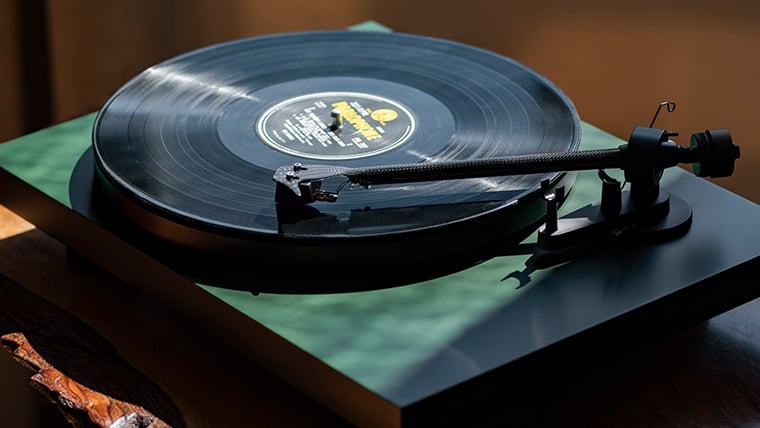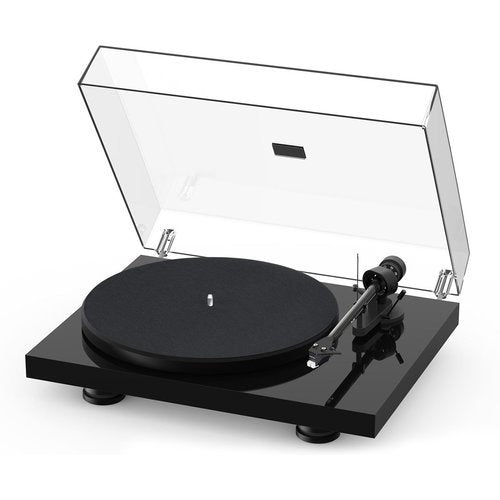Join the fun with us over on our YouTube channel. Click below to subscribe:
Pro-Ject Debut Carbon Evo Vs. Debut Carbon DC Turntable
2020 marks the first year that vinyl sales have surpassed CDs since the 1980s (according to CNET). So it's no surprise that turntable design and the category in general is at the top of its game. And, among the most popular turntables are those from Pro-Ject, who recently released the Debut Carbon Evo (short for Evolution) as an update to their widely lauded Debut Carbon DC. Pro-Ject essentially took their most popular design and improved every aspect of it.
So, what's the difference between the Debut Carbon Evo and its predecessor? At a glance, here's what we found: The EVO includes more stable, height adjustable and damped aluminium feet (also note that Pro-Ject uses 3 feet, not 4 to make leveling a heck of a lot simpler)... and has electronic speed selection via a simple rocker switch on the bottom (no more removing the platter!). The Evo comes in 9 color and finish options. Yes, that's NINE! The new turntable also includes a suspension system borrowed from the higher-end X1 and a hefty aluminum platter, weighing in at about 3.7-pounds. for the US, Pro-Ject included a factory-mounted Sumiko Rainier phono cartridge (a $150 value). Like the original Debut Carbon, the EVO includes a one-piece carbon-fiber tonearm, the same premium gold-plated RCA jacks, and a hinged adjustable dust cover.
Different Strokes
Let's take a look at some of the most important elements side by side:
|
Element |
Debut Carbon DC |
Debut Carbon Evo |
|
Feet |
Vibration-resistant |
TPE-damped aluminum, wider, height adjustable, more stable |
|
Motor Mount |
Motor hung on special rubber bands to damp vibrations |
Motor encased in steel EM shield mounted to plinth using TPE isolation washers |
|
Speed Control |
Must take off platter and move the belt to change speed |
Electronic control changes speed with a flip of the switch, provides more stable signal to motor for more consistent speed |
|
Platter |
Stamped-steel platter has no damping |
Thicker, heavier stamped-steel platter with TPE damping ring; less chance of platter vibrating with sound from speakers |
|
Cartridge |
Ortofon Red included |
European version includes Ortofon Red; US version includes Sumiko Rainier |
|
Reg. Price |
$399 |
$499 |
On Your Feet!
Starting at the bottom, the DC has perfectly serviceable vibration-resistant feet, but the Evo greatly improves on them with new TPE (thermoplastic elastomer)-damped aluminum feet that are wider and more stable. Pro-Ject uses this material in its more expensive models, so it's great to see it here. Even better, the Evo feet are height-adjustable, making it a simple matter to level the turntable. The use of three feet (instead of four) also makes it easier to ensure a level positioning on near any kind of surface.
Motor Function
The motor is the same in both models, but the way it's mounted is completely different. The DC suspends its motor on special rubber bands—which works well to isolate the motor from vibrations—while the Evo motor is mounted in a steel shield mounted to the plinth (the base of the turntable) using TPE isolation washers, which prevents any vibrations from being transmitted from the motor through the plinth to the cartridge. In addition, the shield isolates the motor from stray electromagnetic energy that might interfere with its smooth operation.
The Evo offers a big improvement in the speed control as well. With the DC, you had to remove the platter and move the belt to change from 33 1/3 to 45 RPM. The Evo provides electronic speed control that changes speed with the flip of a rocker switch on the bottom of the plinth. In addition, this provides a more stable signal to the motor, so its speed is more consistent over time. Plus, the placement of the rocker switch streamlines the design of the turntable in general. And that's one of Pro-Ject's design philosophies - keep it simple. A turntable should never have more than it needs - this is not the category where you want more bells and whistles or "flair" of any kind, in function, form, and design. The less there is to interfere with the mechanics and aesthetics, the better it will perform and isolate the sound... and the better it will look!
Platter-tudes & High-Caliber Cartridges
While the inner platter and platter bearing have not changed, the outer platter represents another significant upgrade. The DC uses a stamped-steel platter with no damping, whereas the Evo's platter is thicker stamped steel with a large TPE damping ring around the inner perimeter. That damping ring makes the platter much heavier, so there's less chance it will vibrate in response to sound from the speakers.
The highly regarded carbon-fiber tonearm with sapphire bearings is identical on both units. Then there's the cartridge—the DC comes with an Ortofon Red, which costs $99 on its own. The European version of the Evo also comes with an Ortofon Red, while the US version comes with a Sumiko Rainier, a $150 value by itself. In both cases, you can opt to upgrade the cartridge or even just the stylus if you so desire.
More Colors & Finishes
Some might not be concerned with appearances, but if you are, Pro-Ject's got you with nine finishes and colors. The Evo offers new satin finishes and also includes a real-walnut veneer option. And there are no switches, buttons, or printing on the plinth for a super-clean look in any décor. Again, keeping it simple.
Bottom Line
The Pro-Ject Debut Carbon Evo clearly represents a significant upgrade over the already excellent Debut Carbon DC. So, it's no surprise that the Evo lists for $100 more. But in the world of turntables, even $499 is still a pittance compared with the many thousands of dollars one can spend on an LP spinner. And from what we've seen, you get a whole lot of bang for your buck with this one. If you're a budget-conscious vinyl lover in search of a new turntable, the Pro-Ject Debut Carbon Evo must be at the top of your shortlist!
The Pro-Ject Debut Carbon EVO is also on our best turntables of 2021 award list.



